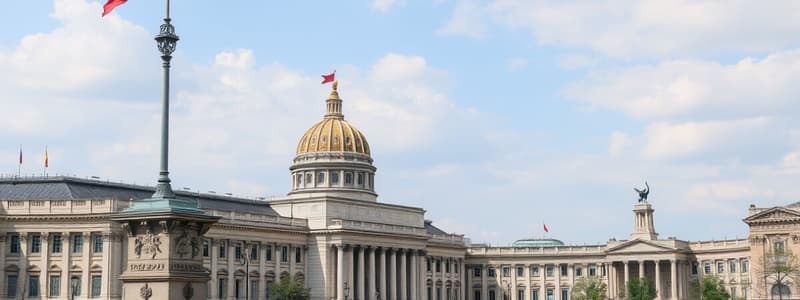Podcast
Questions and Answers
What is defined as the people with the authority to govern a country or state?
What is defined as the people with the authority to govern a country or state?
Government
What is the main function of a government?
What is the main function of a government?
Enforcing existing laws, legislating new laws, and arbitrating conflicts
Which of the following is NOT a characteristic of a state as defined by the Montevideo Convention?
Which of the following is NOT a characteristic of a state as defined by the Montevideo Convention?
- Participation in international trade (correct)
- Permanent population
- Defined territory
- Government
What does sovereignty refer to in the context of modern nation-states?
What does sovereignty refer to in the context of modern nation-states?
Which of the following best defines a nation?
Which of the following best defines a nation?
A state is an organized political community acting under a ________.
A state is an organized political community acting under a ________.
What is one of the inherent powers of the state?
What is one of the inherent powers of the state?
What is the primary purpose of the sumptuary objective?
What is the primary purpose of the sumptuary objective?
What is the compensatory objective aimed at achieving?
What is the compensatory objective aimed at achieving?
What is police power?
What is police power?
What are the requisites for exercising police power?
What are the requisites for exercising police power?
What is the power of eminent domain?
What is the power of eminent domain?
Which of the following is NOT a requisite for the power of eminent domain?
Which of the following is NOT a requisite for the power of eminent domain?
Flashcards are hidden until you start studying
Study Notes
Nature and Scope of Comparative Government and Politics
- Comparative government and politics analyze political institutions, processes, and relationships, contributing to understanding stability and change in political systems.
- Government consists of individuals with the authority to legislate, enforce laws, and resolve disputes within a defined territory.
Study of Comparative Government and Politics
- Government functions at various levels: national, regional, and local, with local governments subordinate to national authority.
- Politics encompasses activities related to governance, emphasizing the methodologies used by governments to exercise power and authority.
- Political science investigates power distribution and resources within a community, as well as interrelations among community groups.
- The distinction between government and politics is significant: government refers to the governing body, while politics pertains to the processes and actions of governance.
Meaning of State, Nation, Sovereignty
- A state is a territory with defined borders and governance, categorized as sovereign if it operates independently without external control.
- An organized political community acts as a state and typically fulfills requirements outlined in the 1933 Montevideo Convention: permanent population, defined territory, government, and capacity for international relations.
- A nation is a group sharing a common culture, history, language, and often resides within a specific region; not all nations possess statehood (e.g., Jewish nation vs. Israel).
- Sovereignty denotes the independence and autonomy of nation-states, allowing them to determine their governance, political structure, and policies without external interference. It can refer to supreme public power or recognized legitimate authority.
Inherent Powers of the State
- Power of Taxation: The authority to impose taxes to fund government functions.
- Police Power: The capacity to regulate behavior and enforce order for the welfare of citizens.
- Power of Eminent Domain: The ability to take private property for public use, with compensation to the owner.
Sumptuary Objective
- Implements state police power for regulatory purposes aimed at controlling extravagance and luxury.
- Serves to advance government objectives as incentives or deterrents.
- Revenue generation is secondary to the primary goals of regulation.
Compensatory Objective
- Aimed at achieving social justice and equitable wealth distribution.
- Supports economic progress aligned with legitimate state objectives.
- Case reference: Southern Cross Cement Corp. v. Cement Manufacturers Assoc. of the Phils.
Police Power
- Authority granted to Legislatures by the Constitution to establish reasonable laws for public welfare.
- Legal maxim: “salus populi est suprema lex” emphasizes the common good as the highest law.
- Every citizen must accept certain burdens for communal benefit; no rights are absolute against the common good.
- Attribute of sovereignty focused on the protection, safety, and order of society.
Nature and Scope of Police Power
- Centers on improving social and economic conditions impacting the community.
- Protects security, life, health, and public welfare in densely populated areas.
- Ensures comfort in community living while allowing for fair use of property.
Requisites of Police Power
- Interests being served must benefit the general public, not specific classes.
- Means employed in enforcement must be necessary and not excessively burdensome on individuals.
Power of Eminent Domain
- State's authority to acquire private property for public use, ensuring just compensation and due process.
- Rooted in the public necessity that must be both reasonable and practical, aiming for minimal inconvenience.
Requisites of Eminent Domain
- Requires actual taking of private property.
- Must serve a public purpose.
- Just compensation is mandatory for taken property.
- Due process must be followed during the acquisition of property.
Studying That Suits You
Use AI to generate personalized quizzes and flashcards to suit your learning preferences.




